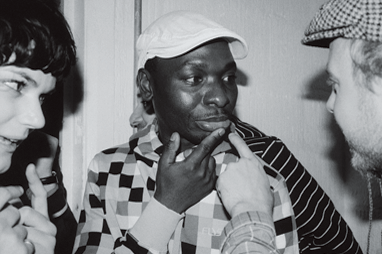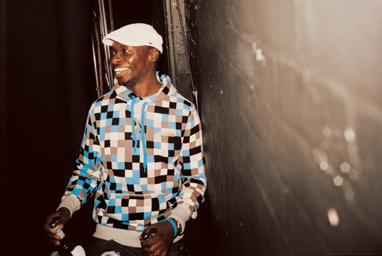Read Sarah Bentley's cover story on Malawi-via-London singer Esau Mwamwaya from FADER Number 52 after the jump, and pick up a few of his newest songs with Radioclit as The Very Best.
Story Sarah Bentley
Photography Liz Johnson Artur
"This is the police. The party is over.” It’s 2:30 AM and the constabulary have come to eject a hundred-plus revellers—mainly inebriated artsy kids in smash-and-grab ensembles of nu rave, boho and other bugged out wears—from a squat party going off in an unused toilet factory in South London. Among the throng are Johan Karlberg and Etienne Tron of London-based production outfit Radioclit and their latest protégé, Malawian singer Esau Mwamwaya. Thirty minutes earlier, during Tron’s DJ set, Mwamwaya performed an impromptu PA of his song “Tengazako”—“Take what’s yours” in Chichewa—a sweet afropop melody voiced over MIA’s Clash-sampling “Paper Planes” beat. The tune has created a load of internet hype around Mwamwaya and though no one at the party knew who he was or what the hell language he was singing in, they responded to it with the same fervor as they would a Klaxons or Simian Mobile Disco show. As the trio wades towards the exit through bottles, lolling bodies, broken hand fans and Mickey Mouse ears, they are accosted by a posse of dudes in the mold of Pete Doherty, who are propping up chicks in 1940s frocks and red lips. “Awesome sound, man…” says the least destroyed one. “No idea what you’re singing about…but fucking awesome sound.”
After decades of being lost in the decidedly uncool and absurdly all-encompassing sonic terrain of world music, contemporary African sounds like kuduro and Cote d’Ivoire party music coupé decallé are suddenly on London’s radar. Unlike France, where African music is comparatively mainstream (in 2005 Malian duo Amadou et Miriam’s album Dimanche à Bamako reached number two and sold 300,000 units domestically), the UK’s immigration history has kept it a stronghold for West Indian culture with scant attention paid to Africa—until now. In the last two years, BBC 1xtra has launched a weekly African Rhythms show, new club nights like Kalabash and Out of Africa play upfront sounds from the continent, and in July 2007 the UK’s first legal African radio station, Voice of Africa, began broadcasting on 93.4FM. If there were an ideal moment for an artist like Mwamwaya to launch, it would be now. The fact that Radioclit—a production outfit on the frontline of adventurous pop music—have decided to record Mwamwaya for their first artist-driven album is a massive testament to that. As Tron says, “The time is now for African sounds.”
Malawi, tucked into the continent’s left breast between Tanzania and Mozambique, is known as the heart of Africa. Mwamwaya was born there in 1975, 11 years after the country gained independence from Britain. He grew up with nine brothers and sisters in the capital city of Lilongwe. Like the majority of Malawian youth, he had a traditional upbringing defined by family, Christian values and the strict rules of President Hastings Banda, who governed the country as a one-party state from 1970 until the 1993 referendum. During this era, entertainment and media were heavily censored. Women were forbidden from wearing trousers or skirts above the knee and men from wearing hair past the collar. The main radio stations played a few traditional Malawian musical genres like tchopa, manganje and vimbuza, but the bulk of broadcasts featured government propaganda. Mwamwaya’s father, however, was a civil servant and a music lover who bought tapes back home whenever he travelled abroad for work. The elder Mwamwaya introduced his son to the joys of Jim Reeves, Gregory Isaacs and Dolly Parton, while Esau’s older brothers indoctrinated him in Lionel Ritchie and locally-produced pop.
Mwamwaya began singing at a young age. At his audition for the Heaters—the house band of one of Lilongwe’s few plush nightspots—Mwamwaya sang Ken Boothe’s “Everything I Own,” Elton John’s “Sacrifice” and Burning Spear’s “Identity.” At 22, he’d never been in a band before, yet by the weekend he was the group’s lead singer, performing a gumball of covers—or “copyrights” as they are called in Malawi—and traditional songs. Months later during a rehearsal, he strode over to the drum kit and started to play. Despite having not touched a drum since his youth (“I’d watched the drummer a bit during rehearsals,” says Mwamwaya) his efforts impressed his bandmates, including four ex-members of the hugely successful group Masaka. Two weeks later, Mwamwaya was singing lead vocals and playing drums, a talent that prompted Karlberg to dub him “the African Phil Collins.”
When he met Radioclit, however, Africa’s answer to Phil Collins hadn’t been involved in music since he came to England in 1999. Leaving Malawi to have “a new life experience” (Britain was easiest because he spoke the language and didn’t need a visa), Mwamwaya worked in a bakery and then on a construction site. These days, he owns a second-hand furniture store in Hackney, where he only stocks items obtained from house clearances in order to ensure that the goods aren’t stolen. Tron met Mwamwaya while perusing the store’s eclectic goods—battered furniture, two meter-long stuffed toy sharks, life-sized ceramic statues of Bruce Lee. He bought a £30 bike and subsequently invited Mwamwaya to his housewarming party, where he was introduced to Radioclit partner Karlberg. “I saw this guy across the room with a massive smile,” Karlberg says, and after talking music, that night Mwamwaya and Radioclit laid down “Chalo,” a track about using love to stop the world’s problems. Since then the tunes haven’t stopped. “It’s exactly what I want to do with music at the moment,” says Karlberg. “Every time Esau sings something new I get goose bumps.” For his part, upon hearing “Chalo” Mwamwaya had “so many ideas—I’ve got eight years bottled up inside me. It’s a lot to get out.”
So far, Mwamwaya has been seizing every insane beat Radioclit has thrown at him—from Baltimore club and nasty-ass crunk to poppy electro and Enya samples. There are songs in Chichewa, Swahili, Portuguese and English, the latter two a result of collaborations with Marina Vello (formerly of Bonde do Role) and MIA. What could sound like a haphazard pillaging of global grooves works seamlessly, with Mwamwaya’s charismatic voice the light, upward-seeking yang to Radioclit’s dark production yin. The duo’s tracks earmarked for the likes of Lil Wayne, Kylie Minogue and Kano have been passed over to their protogé to whip into 21st century hymns for mankind that, although described by Mwamwaya as “sitting in the middle of secular and gospel,” are incredibly pious. Regardless of the beat he’s singing over, Mwamwaya’s cinematic vocals reach for a universal appeal, akin to a Michael Jackson or Elton John mega hit, but remain bolstered by the lush emotional timbre of African choral music. As his full repertoire of material plays at the Radioclit studio, it conjures admittedly hokey new age images of the sun rising over a placid sea or children dancing in the rain after months of drought. “Every time I hear him sing, I get this image of him standing on a mountain, arms outstretched, singing to the world,” admits Karlberg. “We’ve tried to make less pompous tracks—but they always come out like this.”
Though his voice has that mountaintop quality that could make anything sound deep, Mwamwaya’s lyrics are actually as meaningful as they feel to those who don’t speak the language. “Chilombo” tackles the AIDS crisis, with Mwamwaya asking his grandparents to give me a bow and arrow so I can kill the beast. “Zikhulupiliro” urges people to spiritually unite with lines like God and us is one/ It doesn’t matter what religion you’re from/ Your mom told you one plus three equals four/ My mom told me two plus two equals four. “Angonde,” the name of his tribe, pays homage to dead ancestors who (as is tradition in Malawi) are buried in the back garden of the family home. “We believe in family sharing life and death together,” Mwamwaya explains. In keeping with this tenet, Mwamwaya’s brother-in-law Leonard Simbananiye plays guitar on the record, and his three nieces—11-year-old twins Zena and Adine, and 18-year-old Louise—have added harmonies.
A distribution deal has yet to be signed (though offers have begun to pour in) and Radioclit hopes to have a street mixtape out for spring and an album by summer. “The UK and US are bored of hearing the same shit,” says Tron. “People are ready for something not in English to come through. Growing up in France listening to Wu-Tang, I didn’t have a clue what they were talking about, but I was still the biggest fan in the world. Some musicians are so good they can reach everyone on vibe alone. Esau is like that.” In the meantime, Mwamwaya will continue to traverse his curious circuit between gigs on London’s pulsing underground and drum practice for his local church—a testament to both the unlikeliness of his path and the universality of his sound. As Mwamwaya himself says, “I can be found everywhere.”


